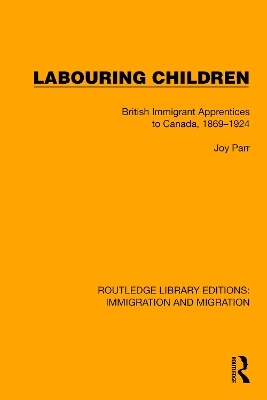
Labouring Children
British Immigrant Apprentices to Canada, 1869–1924
Seiten
2022
Routledge (Verlag)
978-1-032-36732-3 (ISBN)
Routledge (Verlag)
978-1-032-36732-3 (ISBN)
- Titel z.Zt. nicht lieferbar
- Versandkostenfrei innerhalb Deutschlands
- Auch auf Rechnung
- Verfügbarkeit in der Filiale vor Ort prüfen
- Artikel merken
Labouring Children (1980) is a study of child immigrants apprenticed as agricultural labourers and domestic servants in rural Canada, based on numerous original sources, and presents new views on childhood, social work and Canadian rural communities.
Labouring Children (1980) is a study of child immigrants, based on numerous original sources, and presents new views on childhood, social work and Canadian rural communities. Between 1868 and 1925 eighty thousand British boys and girls, mostly under fourteen, were apprenticed as agricultural labourers and domestic servants in rural Canada. A surprising feature is the involvement of the Evangelicals, who considered that they were giving children from poor homes a fresh start in the world, yet who were otherwise famed for their emphasis on the virtues of close family ties; and conversely, the parents of the children, largely labourers, who were at the time regarded as too ground down by economic imperatives to find time for affection, but who expended a great deal of effort to maintain contact across imposing distances.
This book begins with an analysis of the growing child’s place within these families, and looks at the alternating prominence of demands for wage labour and fear of the ‘dangerous classes’ which influenced emigration policy idealism. The demand for child labour in rural Canada and the work of the children is described in an analysis of the apprenticeship system. The book also illustrates how the British child immigrants were household rather than family members in Canada and outsiders in the rural schoolroom as well. As adults they did not generally become farmers but entered factory jobs, service employment in urban Canada, migrated to the US or returned to Britain. Finally, the book discusses the ending of the movement after World War I, as Canadian social workers, echoing British socialists, argued that even the children of the poor deserved fourteen years of growing and schooling before they were obliged to sell their labour. Incorporating much rich documentation from numerous case records, and presenting a new quantitative use of some of those records, this book sheds light on a dark corner of the Canadian migrant experience.
Labouring Children (1980) is a study of child immigrants, based on numerous original sources, and presents new views on childhood, social work and Canadian rural communities. Between 1868 and 1925 eighty thousand British boys and girls, mostly under fourteen, were apprenticed as agricultural labourers and domestic servants in rural Canada. A surprising feature is the involvement of the Evangelicals, who considered that they were giving children from poor homes a fresh start in the world, yet who were otherwise famed for their emphasis on the virtues of close family ties; and conversely, the parents of the children, largely labourers, who were at the time regarded as too ground down by economic imperatives to find time for affection, but who expended a great deal of effort to maintain contact across imposing distances.
This book begins with an analysis of the growing child’s place within these families, and looks at the alternating prominence of demands for wage labour and fear of the ‘dangerous classes’ which influenced emigration policy idealism. The demand for child labour in rural Canada and the work of the children is described in an analysis of the apprenticeship system. The book also illustrates how the British child immigrants were household rather than family members in Canada and outsiders in the rural schoolroom as well. As adults they did not generally become farmers but entered factory jobs, service employment in urban Canada, migrated to the US or returned to Britain. Finally, the book discusses the ending of the movement after World War I, as Canadian social workers, echoing British socialists, argued that even the children of the poor deserved fourteen years of growing and schooling before they were obliged to sell their labour. Incorporating much rich documentation from numerous case records, and presenting a new quantitative use of some of those records, this book sheds light on a dark corner of the Canadian migrant experience.
Joy Parr
1. British Working Children 2. Salvation and the Safety-valve 3. The Promised Land 4. Family Strategy and Philanthropic Abduction 5. Apprenticed or Adopted 6. Household and School 7. Adulthood 8. Twentieth-century Policy
| Erscheinungsdatum | 31.10.2022 |
|---|---|
| Reihe/Serie | Routledge Library Editions: Immigration and Migration |
| Verlagsort | London |
| Sprache | englisch |
| Maße | 156 x 234 mm |
| Gewicht | 520 g |
| Themenwelt | Geschichte ► Allgemeine Geschichte ► Neuzeit (bis 1918) |
| Geisteswissenschaften ► Geschichte ► Regional- / Ländergeschichte | |
| Sozialwissenschaften ► Ethnologie | |
| Sozialwissenschaften ► Soziologie | |
| ISBN-10 | 1-032-36732-6 / 1032367326 |
| ISBN-13 | 978-1-032-36732-3 / 9781032367323 |
| Zustand | Neuware |
| Haben Sie eine Frage zum Produkt? |
Mehr entdecken
aus dem Bereich
aus dem Bereich
Europa 1848/49 und der Kampf für eine neue Welt
Buch | Hardcover (2023)
DVA (Verlag)
48,00 €
Giordano Bruno - ein ketzerisches Leben
Buch | Hardcover (2024)
C.H.Beck (Verlag)
29,90 €


